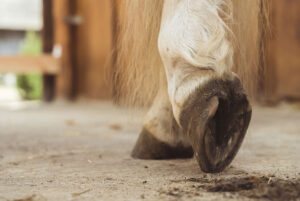Equine Nutritionists Help Assure Proper Feeding
- Topics: Article
Since much decision-making about feeding horses continues to be based on folklore, tradition, and misinformation, owners and trainers are encouraged to use nutrition resources, reported Olivia Martin at the 2010 Kentucky Equine Research (KER) Nutrition Conference held April 26-27. Martin operates the independent equine nutrition consulting firm Performance Feeding Inc. and supplies feeding advice and research-based supplements for horses throughout the United States.
During her presentation titled "Feeding horses at the Winter Equestrian Festival: A review of common practices," Martin relayed key findings from her research conducted during the 2008 Winter Equestrian Festival. In total, 181 horses were weighed and had every feed component for each ration weighed and analyzed.
Key findings were:
-
Most horses did not receive the recommended 2-2.5% dry matter intake (DMI) per day.
-
Timothy hay was the forage of choice, but many horses received only small amounts of hay (as low as 30% of the total ration) per day.
-
17/181 horses were fed a grain-based diet rather than primarily hay.
-
Approximately 85% of horses were fed some form of nutritional supplement (e.g., hoof, joint, digestive, general vitamin and mineral, vitamin E, selenium), but only 15% of owners/trainers received advice from an equine nutritionist regarding their choices.
Many horses included in the study had significant nutrient deficiencies such as calcium, magnesium, potassium, iodine, and copper. Even sodium and chloride levels were low by simply not having access to a free-choice salt block
Create a free account with TheHorse.com to view this content.
TheHorse.com is home to thousands of free articles about horse health care. In order to access some of our exclusive free content, you must be signed into TheHorse.com.
Start your free account today!
Already have an account?
and continue reading.

Related Articles
Stay on top of the most recent Horse Health news with


















